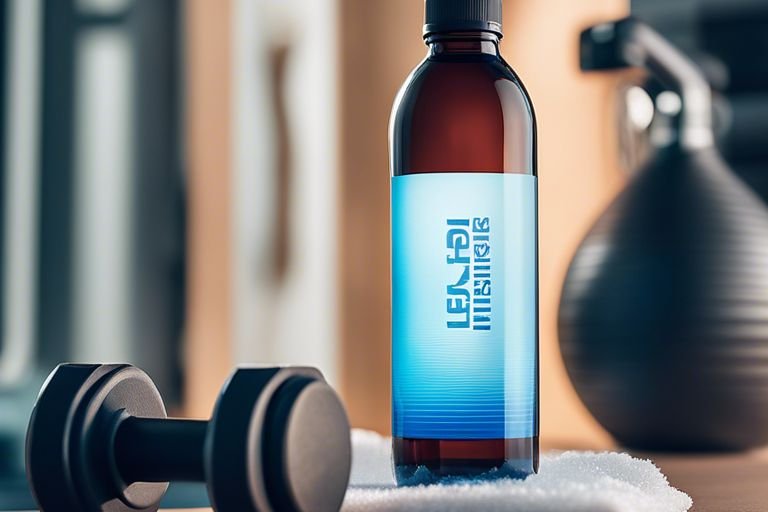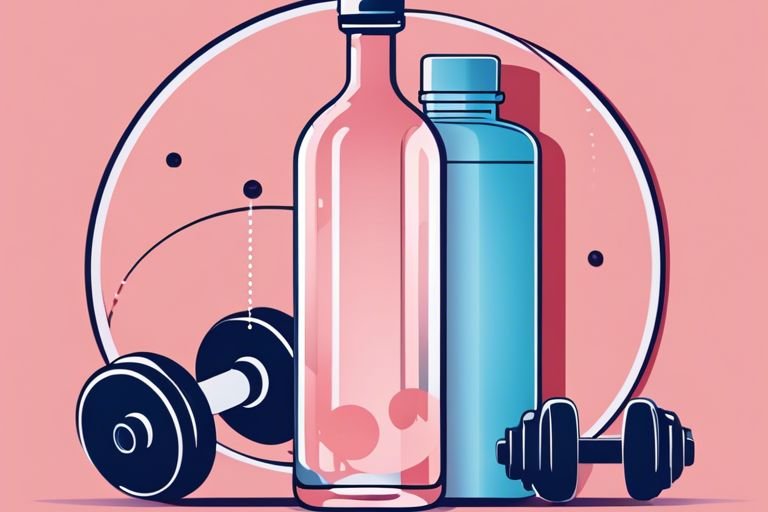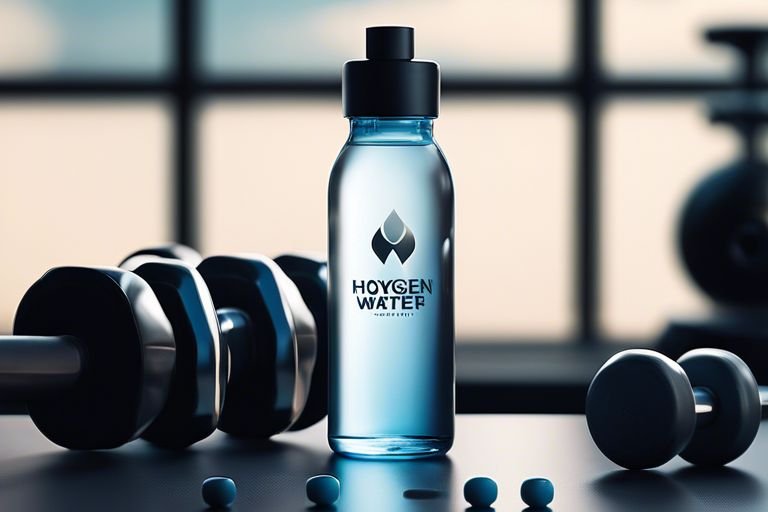Water is necessary for overall health, but have you considered the benefits of hydrogen water? This innovative beverage, infused with molecular hydrogen, has gained attention for its potential to enhance muscle recovery after intense workouts. By exploring what hydrogen water is and how it may benefit your post-exercise routine, you can discover whether it could be a valuable addition to your regimen. Understanding the science behind its effects can empower you to optimize your recovery and overall performance.

Key Takeaways:
- Hydrogen Water Definition: Hydrogen water is water that has been infused with molecular hydrogen gas, which is believed to have antioxidant properties that can combat oxidative stress.
- Muscle Recovery Benefits: Consuming hydrogen water may enhance muscle recovery post-exercise by reducing inflammation and oxidative damage, leading to faster rehabilitation.
- Scientific Studies: Recent research suggests that hydrogen water can improve exercise performance and decrease muscle fatigue, making it a potential recovery aid for athletes.
- Hydration Influence: While hydrogen water can provide additional benefits, maintaining proper hydration is necessary for optimal muscle recovery and overall health.
- Usage Recommendations: To maximize recovery effects, athletes may consider incorporating hydrogen water into their post-workout routine, alongside other recovery strategies like nutrition and rest.
Understanding Hydrogen Water
While water is vital for maintaining good health, the introduction of hydrogen water into your routine can bring a new dimension to hydration. Hydrogen water is simply water (H2O) that has been infused with molecular hydrogen (H2). This infusion can enhance the water’s properties, potentially providing you with various health benefits that go beyond regular hydration. It is important to understand the distinct qualities that hydrogen water offers to fully appreciate its effects, particularly in areas like muscle recovery.
Definition and Composition
An intriguing aspect of hydrogen water is its composition. Essentially, hydrogen water consists of standard water with an extra infusion of hydrogen gas. This process can happen either through electrolysis or by using magnesium sticks that release hydrogen when they come into contact with water. The result is water that has a higher concentration of dissolved hydrogen, purported to have antioxidant properties, which can be beneficial for your overall health and recovery processes.
Some studies suggest that the molecular hydrogen present in hydrogen water can penetrate cell membranes easily and may help reduce oxidative stress within the body. This trait can be particularly beneficial after intense physical activity, as oxidative stress can lead to muscle fatigue and longer recovery times. Thus, understanding its composition is vital for recognizing how it might contribute to enhanced recovery.
Key Differences from Regular Water
Water is vital for hydration, but hydrogen water differentiates itself from regular water through its molecular composition and potential health effects. The key difference lies in the addition of molecular hydrogen, a non-toxic gas that can function as a selective antioxidant. Unlike regular water, which provides vital hydration but lacks additional health benefits, hydrogen water may help mitigate inflammatory responses and aid in muscle recovery, making it a noteworthy addition to your post-workout regimen.
It’s vital to emphasize that while both types of water hydrate your body, the additional hydrogen molecules in hydrogen water can support cellular functions and combat oxidative stress after physical activities. This unique property sets hydrogen water apart as more than just ordinary hydration, potentially giving you an edge in your recovery efforts.
Historical Context and Uses
Differences in the approaches to hydration have existed for centuries, but the introduction of hydrogen water is a relatively modern development. Historically, the benefits of water enriched with hydrogen were first explored in Japan, where early research indicated potential advantages. In more recent times, hydrogen water has garnered attention in various health circles worldwide, becoming a popular choice among athletes looking for optimal recovery solutions after intense training sessions.
Regular use of hydrogen water can lead to better hydration strategies, specifically targeted at muscle recovery and overall health. As this trend continues to grow, more individuals incorporate hydrogen water into their lives, not just for hydration but for the additional benefits it promises to support your active lifestyle.

Mechanism of Hydrogen in the Body
Clearly, understanding the mechanisms by which hydrogen functions in your body can help you appreciate its potential benefits, especially regarding muscle recovery. Hydrogen is a colorless, tasteless gas that, when dissolved in water, forms hydrogen-rich water. This unique substance has been studied for its remarkable properties, including its capacity to act as an antioxidant, enhance cellular metabolism, and reduce inflammation—elements that can collectively contribute to improved muscle recovery after intense exercise.
Antioxidant Properties
Body tissues often encounter oxidative stress due to the byproducts of intense physical activity. This stress can lead to muscle fatigue and damage, impeding your recovery process. The antioxidant properties of hydrogen water come into play here; studies suggest that hydrogen molecules can effectively neutralize harmful free radicals, thus reducing oxidative stress at the cellular level. By mitigating this damage, hydrogen water can help safeguard muscle integrity and accelerate recovery.
This antioxidant effect is particularly beneficial following strenuous workouts. When you consume hydrogen water, you may notice a decrease in muscle soreness and inflammation, enabling you to return to your training routines more swiftly. Overall, incorporating hydrogen water into your post-exercise regimen could help support your body’s natural recovery mechanisms.
Cellular Metabolism and Energy Production
One of the fascinating aspects of hydrogen’s role in the body is its influence on cellular metabolism and energy production. During exercise, your body relies on various metabolic pathways to convert nutrients into energy. Hydrogen can enhance these processes by improving mitochondrial function, which is crucial for energy production. Improved mitochondrial efficiency means your muscles can utilize energy more effectively, potentially leading to better performance and reduced fatigue.
Another important consideration is that enhanced energy production may allow you to work out more intensely or for more extended periods. As your muscles recover faster and perform better due to the supportive role of hydrogen, you may find that your overall fitness levels improve more rapidly than they would otherwise.
Inflammation Reduction
The negative impact of inflammation on muscle recovery cannot be overstated. The process of repairing muscle fibers after stress often leads to inflammation, which can prolong discomfort and delay recovery. Fortunately, hydrogen water has demonstrated potential in reducing this inflammation, thanks to its unique properties that can modulate the inflammatory response in your body. By limiting the production of pro-inflammatory cytokines, hydrogen can create a more favorable environment for muscle recovery.
Mechanism studies suggest that hydrogen’s anti-inflammatory effects promote quicker healing and less muscle stiffness. By incorporating hydrogen water into your post-workout routine, you could experience a decrease in recovery time, allowing you to maintain your training schedule without the burdens of excessive soreness or prolonged inflammation.
Muscle Recovery Process
Many individuals underestimate the complexity of the muscle recovery process that occurs after exercise. When you engage in physical activity, especially high-intensity workouts, your muscles experience micro-tears, which are a normal part of building strength. Recovery is not just about resting; it involves a series of physiological phases that work together to repair and rebuild muscle tissue. Recognizing these phases helps you understand how your body heals and how you can support that process through various means, such as nutrition, hydration, and rest.
Overview of Muscle Recovery Phases
Recovery begins immediately after exercise and progresses through a series of critical phases. Initially, your body’s acute response involves inflammation, where immune cells are sent to the site of the muscle damage to clear out debris and begin the repair process. In the subsequent phase, your body shifts into the anabolic stage, where muscle protein synthesis occurs, allowing for muscle growth and strength rebuilding. Optimally managing these phases will enhance your overall recovery and improve your performance in future workouts.
Role of Hydration in Recovery
Process hydration plays a vital role in muscle recovery. Your body loses fluids during exercise, and replenishing these is crucial to restore optimal physical function. Dehydration can hinder the healing process, exacerbate muscle soreness, and prolong recovery time. Therefore, ensuring that you are well-hydrated before, during, and after exercise will expedite your recovery process and keep your muscles functioning efficiently.
Maintaining proper hydration supports the transportation of nutrients required for muscle repair. Water is imperative for the enzymatic processes that catalyze recovery, and it also helps maintain the optimal muscle temperature during recovery. You want to aim for a consistent hydration regimen, ensuring you drink not only water but electrolyte-rich beverages if you engage in prolonged activities, as this will help restore the balance of salts lost through sweat.
Importance of Antioxidants in Recovery
Phases of muscle recovery also heavily depend on the role of antioxidants. Free radicals are generated during intense exercise, which can lead to oxidative stress and cellular damage. These free radicals can impair the recovery process, leading to more muscle soreness and fatigue. Incorporating antioxidants into your post-exercise nutrition can help neutralize these harmful compounds, facilitating a more efficient recovery.
Incorporating a variety of antioxidant-rich foods, such as berries, nuts, and leafy greens, into your diet is imperative for combating oxidative stress. Not only do these foods support muscle recovery, but they also promote overall health. Understanding the timing of your antioxidant intake can optimize their effects; consuming them within the post-exercise window will be particularly beneficial in supporting quicker recovery and reducing delayed onset muscle soreness.
Understanding the multifaceted nature of muscle recovery emphasizes the importance of a holistic approach. By focusing on hydration, nutrition, and incorporating antioxidants, you can significantly improve your recovery process and maintain peak performance in your physical activities. Empower yourself with the knowledge of how recovery works, and apply these insights to help your muscles heal more efficiently.

Effects of Hydrogen Water on Muscle Recovery
Not only does hydrogen water provide hydration, but emerging research suggests that it may also play a significant role in enhancing muscle recovery after strenuous exercise. As you push your body to its limits, the need for effective recovery becomes paramount. One of the primary effects of hydrogen water is its potential to reduce oxidative stress, which can harken back to your workout, helping your muscles recover more swiftly and efficiently. Over time, this can lead to improved overall recovery rates, allowing you to get back to your training with minimal downtime.
Enhanced Recovery Times
Any athlete knows that the window for optimal recovery is a critical component of training. Incorporating hydrogen water into your post-workout regimen may decrease recovery times significantly. This can be particularly beneficial if you are training for events or competitions where performance peaks are crucial. Studies suggest that the antioxidant properties of hydrogen water not only help combat fatigue but also mitigate cellular inflammation, enabling your muscles to bounce back faster.
Reduction in Muscle Soreness
Reduction in muscle soreness is another key effect of hydrogen water that you may find beneficial. You might experience delayed onset muscle soreness (DOMS) after an intense workout, an outcome that can impede your progress and motivation. By drinking hydrogen water, you could decrease the severity of such soreness, making it easier for you to stick to your training schedule and avoid burnout.
Recovery is an crucial aspect of muscle growth and overall fitness. By addressing muscle soreness effectively, hydrogen water could allow you to push harder in subsequent workouts without the discomfort that typically follows. Thus, maintaining your motivation and performance levels becomes much easier, leading to a more sustained commitment to your fitness goals.
Benefits for Athletic Performance
Hydrogen water extends its benefits beyond mere recovery; it also has implications for enhancing your athletic performance. When you hydrate with hydrogen-infused water, you may find that your energy levels are higher during workouts, enabling you to perform at your best. As this water acts to improve your oxidative stress response, your endurance may receive a boost, allowing you to train longer and harder without as much fatigue.
Recovery becomes a seamless part of your training process, instilling a sense of confidence in your ability to tackle increasingly challenging workouts. With improved athletic performance on the horizon, integrating hydrogen water into your routine could be the game-changer you’ve been looking for to optimize your fitness journey.
Scientific Research on Hydrogen Water
Once again, the growing interest in hydrogen water has sparked numerous scientific inquiries into its effects, especially in muscle recovery. Research has been examining how the unique properties of hydrogen can benefit athletes and active individuals, making it an enticing topic for those looking to enhance their performance. To gain deeper insights, you can explore How Hydrogen Water Boosts Your Workouts and Improves … this comprehensive blog that reviews the current findings.
Recent Findings and Studies
Any discussion surrounding hydrogen water must acknowledge the burgeoning body of research that supports its potential benefits. Recent studies have indicated that hydrogen-infused water might help mitigate oxidative stress, a common issue that arises during and after intense workouts. Oxidative stress can hinder your muscle recovery, and by counteracting its effects, hydrogen water may not only improve your recovery time but also enhance overall performance.
Additionally, a number of clinical trials have focused on specific populations, including athletes and individuals undergoing rigorous training regimens. These studies have demonstrated promising results, showing that hydrogen water could lead to reduced muscle fatigue and improved physical endurance. While results are compelling, it’s necessary to consider the broader context of these findings and their applicability to your own fitness journey.
Limitations and Criticisms of Current Research
Studies concerning the benefits of hydrogen water are still in their infancy, which leads to certain limitations in the research landscape. Many existing studies have small sample sizes, making it difficult to generalize results to the larger population. Additionally, some studies have relied on subjective measures of recovery and performance, which can vary widely among individuals and may not provide a complete picture of hydrogen water’s efficacy.
A significant criticism is also directed towards the lack of long-term studies examining the cumulative effects of hydrogen water on muscle recovery and overall health. Without this comprehensive data, you may find it challenging to determine how beneficial hydrogen water truly is over an extended period. As with any emerging area of research, it is prudent to take the current findings with caution while awaiting more robust evidence.
Current Consensus in the Sports Science Community
Water plays a critical role in your muscle recovery process, and the introduction of hydrogen water has certainly piqued the interest of many in the sports science community. While there is a growing body of evidence supporting its benefits, experts still encourage you to consider hydrogen water as a supplement to, rather than a replacement for, traditional hydration methods. Optimal recovery often involves a multifaceted approach, including nutrition, hydration, and rest.
Understanding the current consensus reveals that while hydrogen water shows promise, more extensive, rigorously designed studies are necessary to establish its status definitively. Until we reach that point, it’s best to incorporate hydrogen water into your regimen carefully and monitor its effects on your own body. Always remember, what works for one person may not necessarily work for another; thus, personal experimentation will remain key in determining the role of hydrogen water in your recovery strategy.
How to Incorporate Hydrogen Water into Your Routine
All athletes and health enthusiasts are constantly searching for effective ways to enhance their performance and recovery. Incorporating hydrogen water into your daily regimen could be a game-changer. By understanding the proper practices and timings, you can maximize the benefits of hydrogen water, potentially leading to improved muscle recovery and reduced fatigue. Here are some practical tips to help you include hydrogen water in your routine.
Best Practices for Consumption
For optimal effects, you should consume hydrogen water shortly before, during, or after your workout. This timing allows your body to absorb the molecular hydrogen when it can be most beneficial. To make it a part of your routine, consider keeping a portable hydrogen water bottle with you, ensuring that you have access to it throughout your day. It’s also important to note that hydrogen gas is best absorbed fresh, so try to avoid storing it for extended periods once it’s been generated.
Additionally, consider integrating hydrogen water into your recovery meals or shakes. This combination can help enhance nutrient absorption and support the recovery process further. Always listen to your body and adjust your consumption based on how you feel; personal experience can greatly influence how beneficial you find hydrogen water.
Recommended Dosage and Timing
An effective approach to incorporating hydrogen water involves determining the right dosage that works for you. Many studies suggest that consuming about 1-2 liters per day can be beneficial for enhancing muscle recovery and reducing fatigue. However, it’s important to remember that everyone’s needs vary; you may need to experiment with different amounts to see what feels best for your body.
Understanding the timing of your hydrogen water consumption also plays a critical role. Consuming hydrogen water pre-workout may give you an energy boost, while post-workout consumption can aid in recovery. You may find that sipping hydrogen water throughout your sessions helps maintain hydration levels and optimize performance.
Potential Considerations and Risks
Considerations around hydrogen water mainly involve its high purity and safety profile. Although generally regarded as safe, you should always be cautious of any potential interactions with medications or other supplements you may be taking. It’s also wise to consult with a healthcare professional if you have any pre-existing health conditions, as individualized advice can provide further clarity.
Dosage adjustments may be necessary depending on your personal health profile and activity level. Some people may experience mild digestive changes initially, so begin with smaller amounts and gradually increase your intake as your body adapts. Listening to your body is key to ensuring that your experience with hydrogen water is both safe and effective.
Future Directions and Research Opportunities
To fully grasp the potential of hydrogen water, ongoing studies are important to elucidate its mechanisms and benefits in muscle recovery. As more research surfaces, the understanding of how hydrogen-infused water works at a cellular level may open new pathways for optimization in athletic performance and recovery strategies. You can explore existing findings in more detail through resources like Hydrogen Therapy for Muscle Recovery, which sheds light on this fascinating area. Emerging trends indicate a surge in interest around how hydrogen water therapy might enhance athletic performance and physical wellness. Researchers are keen to investigate the long-term effects of regular consumption of hydrogen water on recovery times, muscular endurance, and even inflammation reduction, encouraging you to stay updated as studies evolve.
Emerging Trends in Hydrogen Water Studies
Future research is also delving into the specific conditions under which hydrogen water is most effective for muscle recovery. For instance, you might find emerging studies focusing on differing doses, timing of intake, or varying types of physical exertion to identify the best practices for maximizing therapeutic benefits. Understanding these nuanced factors can significantly influence how you might incorporate hydrogen water into your recovery routines.
Potential Applications in Other Health Domains
To extend the horizons of hydrogen water research, scientists are examining its implications beyond muscle recovery, particularly in areas such as metabolic health, chronic inflammation, and oxidative stress. The antioxidant properties of hydrogen could potentially offer a novel approach to combat various health challenges, underlining its versatility. You may want to keep an eye on these explorations, as they not only have implications for athletic performance but also for general health improvement.
Opportunities abound for exploring how hydrogen water can beneficially affect other health domains, like cardiovascular health and neuroprotection. This could mean that simple changes, such as incorporating hydrogen-rich water into your daily diet, may lead to broader wellness advancements. If proven successful, these applications could pave the way for innovative therapeutic regimens that promote overall health and well-being.
Calls for Further Research
Research in the field of hydrogen water and its myriad applications is just beginning, and the need for further investigation is clear. You can look forward to new studies that not only focus on muscle recovery but also on other health aspects where hydrogen has shown promise. This calls for collaborative research efforts that could involve athletes, dietitians, and health care professionals to develop best practices and guidelines for use.
It is imperative to gather more data to confirm the therapeutic benefits and safety profiles of hydrogen water across diverse populations and conditions. More studies will allow you to make informed choices about incorporating hydrogen water into your lifestyle, ensuring that it complements your health, fitness, and recovery goals effectively.
Final Words
Upon reflecting on the concept of hydrogen water and its potential effects on muscle recovery, it’s clear that this innovative beverage offers intriguing possibilities for enhancing your post-exercise routine. Enriched with molecular hydrogen, this water is believed to possess antioxidant properties that may help reduce inflammation and oxidative stress in your muscles. If you’re seeking ways to speed up recovery and improve performance, incorporating hydrogen water into your regimen could be worth considering. However, it’s important to remain informed and consider individual responses to such interventions, as the available research is still evolving.
As you explore the benefits of hydrogen water, you should approach it as a complementary tool rather than a cure-all solution. Maintaining a balanced diet, staying hydrated, and engaging in proper recovery practices are fundamental to your overall muscle health. While initial studies are promising, you should continue to monitor scientific developments and consult with healthcare professionals to determine if hydrogen water aligns with your personal fitness and wellness goals. In doing so, you can effectively harness the advantages of this emerging trend in your journey towards optimal muscle recovery.
FAQ
Q: What is hydrogen water?
A: Hydrogen water is regular water (H2O) infused with molecular hydrogen (H2) gas. This infusion process increases the concentration of hydrogen molecules in the water, which may enhance its antioxidant properties. Hydrogen water is often touted for its potential health benefits, including improved hydration, reduced inflammation, and enhanced recovery from physical strain.
Q: How does hydrogen water affect muscle recovery?
A: Hydrogen water is believed to aid muscle recovery by reducing oxidative stress and inflammation in the body. When we exercise, our muscles naturally produce free radicals and reactive oxygen species, which can lead to muscle fatigue and soreness. The antioxidants in hydrogen water may help neutralize these harmful compounds, potentially leading to decreased muscle soreness and a more efficient recovery process after intensive workouts.
Q: Is there scientific evidence supporting the use of hydrogen water for muscle recovery?
A: Yes, several studies have explored the effects of hydrogen water on exercise performance and recovery. Research indicates that hydrogen water may help reduce markers of oxidative stress and inflammation in athletes, suggesting a potential benefit for muscle recovery. However, while promising, more extensive clinical trials are needed to fully understand the extent of its effects and establish standardized dosage recommendations.
Q: How should I incorporate hydrogen water into my routine for optimal muscle recovery?
A: To potentially harness the benefits of hydrogen water for muscle recovery, you can start by drinking it shortly after exercising to help mitigate post-workout oxidative stress. Additionally, regular hydration with hydrogen water throughout the day may help to maintain the antioxidant effects. It’s important to combine it with other recovery strategies such as proper nutrition, adequate sleep, and stretching for optimal results.
Q: Are there any side effects associated with drinking hydrogen water?
A: Hydrogen water is considered safe for most individuals and has few reported side effects. However, some people may experience mild gastrointestinal discomfort when consuming large amounts. As with any health supplement, it’s advisable to consult with a healthcare professional, especially if you have existing health conditions or are taking medications, to ensure that it is appropriate for your situation.

